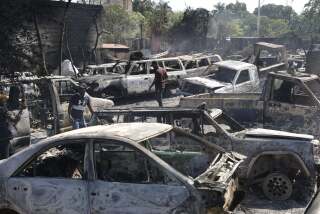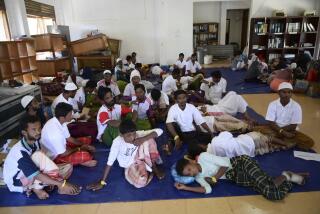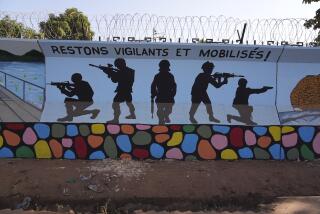E. Timorese Emerge From Hiding to Seek Food, Family : Asia: Some refugees loot supplies before being turned back. Capital tense despite peacekeepers’ presence.
More than a thousand refugees carrying the flag of pro-independence East Timor streamed out of the mountains Wednesday to seek food, look for missing relatives and test the safety of this territorial capital.
At one point, desperate East Timorese looted warehouses, making off with huge sacks of rice, sugar and cooking oil before international peacekeepers turned the crowd back.
But the refugees, many of them young men, did not stay long. By nightfall, most had returned to their forested hiding places, not certain that security had returned to this city where anti-independence militiamen have shed their makeshift uniforms--headbands and black T-shirts--but still roam the streets in ones and twos.
“I think the militias realize they are in a bad position,” said a Catholic priest here. “People know who they are. The Australians can find out who they are. Probably the only reason they haven’t left is because they couldn’t find a vehicle to take them to West Timor.”
The Australian-led peacekeeping force that began arriving here Monday stepped up patrols on foot and in armored personnel carriers after a Dutch journalist was slain Tuesday by men reportedly wearing the uniform of Indonesian police. In some cases, Indonesian troops patrolled the capital jointly with the Australians.
Throughout Wednesday, peacekeeping troops and equipment continued to pour into Dili’s airport and harbor. At the same time, Indonesian soldiers were headed in the opposite direction--destined for reassignment outside East Timor as part of the military evacuation from this former Portuguese colony.
East Timor was invaded by Indonesia in 1975 and annexed the following year. Anti-independence militias ran amok in the territory after the East Timorese voted overwhelmingly Aug. 30 in a United Nations-sponsored election to seek independence. The peacekeepers have a mandate from the U.N. to use “all necessary force” to restore order.
Despite the presence of the peacekeepers, several buildings were set afire here Wednesday--by Indonesian soldiers, residents said--and plumes of dark smoke hung over the devastated seaside city. There was no shooting, but Dili remained tense and the deserted streets at night were potentially dangerous, as was almost every road leading out of the city.
But in Becora, a town two miles east of Dili, militias shot wildly into the air and burned several homes. All but four of Becora’s buildings have been razed or gutted, and a refugee returning here from the town described the mood as extremely unsettled. The peacekeeping force has not yet dispatched troops to Becora or most of Dili’s other outlying areas.
Several thousand refugees lined Dili’s beach, where they have set up a squatters’ camp. They are surrounded by their possessions, most of which were looted from burned-out shops and homes, and several said they have adequate supplies of rice.
Dili itself lives in a twilight zone, half-dead, half-alive. Not a single building appears to have escaped the militia rampage. Garbage litters the streets. Only a handful of buildings have electricity or water. Most of the population of 200,000 has fled, and the only people here are refugees, military personnel and a few aid workers and journalists.
The continued violence and the slaying of journalist Sander Thoenes have made humanitarian agencies even more wary of using foreign staff in front-line positions unless there is a large and friendly military force present, field workers say.
Thoenes, 30, who was working for Britain’s Financial Times, was shot while traveling by motorcycle only a few miles from the capital.
“We are not free to go to many of the camps because we are white and considered the enemy. We can only send local staff,” aid worker Anna Bilellio of the U.N. World Food Program said in Kupang, the capital of West Timor. The neighboring Indonesian province has absorbed tens of thousands of refugees--and retreating militia members--from East Timor.
The aid agency managed Tuesday to send several American, English and European officials to refugee camps in the East and West Timor border area, where militias have a strong presence.
“We were received peacefully,” she said. “Nothing happened only because we were accompanied by a truckful of soldiers. If you want to create public order, you need security.”
Officials at the International Committee of the Red Cross, which is working jointly with the Red Crescent Society, said their agency has been targeted by militia members despite efforts to stress its neutrality and apolitical stance.
“It’s quite dangerous to put expatriates in the field,” said Sri Endah, a Red Cross official. “In [the West Timor town of] Atambua we don’t put any expats, just locals. In Kupang we have three shifts, but they’re Asians not Westerners.”
But protecting an estimated 200,000 people displaced from their homes who are living for the most part in the open is the biggest challenge ahead for the United Nations, which is administering East Timor during the expected transition to independence.
Military sources say a small contingent of U.N. personnel, including mission chief Ian Martin, plans to return here today to the compound evacuated last week during the height of militia violence.
Joel Boutroue, representative of the U.N. Office for the Coordination of Humanitarian Affairs, said the world body has four planes making daily airdrops of blankets, plastic sheets, packaged food and other supplies.
“We’re trying to tell people, stay where you are, don’t loot warehouses,” Boutroue said. “But it’s easier said than done. There will be chaos for a few weeks.”
Lamb reported from Dili and Magnier from Jakarta, Indonesia.
More to Read
Start your day right
Sign up for Essential California for news, features and recommendations from the L.A. Times and beyond in your inbox six days a week.
You may occasionally receive promotional content from the Los Angeles Times.






